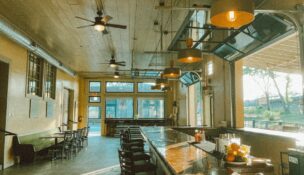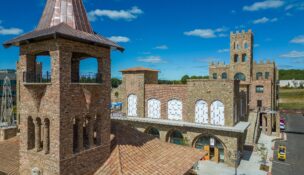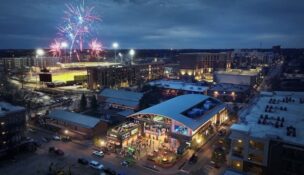Here’s a look at how craft breweries in South Carolina have fared over the past decade
Krys Merryman //July 6, 2023//
Here’s a look at how craft breweries in South Carolina have fared over the past decade
Krys Merryman //July 6, 2023//
Did you know that since the 2013 “pint law” was passed in South Carolina there has been more than a 1000% increase in the number of breweries that have opened in the state?
This law allowed patrons to buy up to three pints onsite, and although this growth of openings has slowed down over the last few years, craft beer in South Carolina is still growing—but at a slower pace than in previous years, according to Bristow Beverage Law Attorney Brook Bristow.
The state has seen the trend for openings happening mostly in metro areas, with a few that have filled in secondary cities, he said.
So far this year, there have been seven new breweries that have opened in the state: three in the Upstate, two in the Midlands, one in the Lowcountry, and one in Rock Hill, said Bristow. To contrast this data, there has been only one closing this year: Brewery 85 in Greenville, so this shows there are more openings than closings, he added.
There are three types of breweries: traditional brewery, microbrewery, and brewpubs. Breweries are still most common but brewpubs have continued to boom in recent years.
A brewery is a place where beer is produced commercially on a large scale, while a brewpub is a smaller scale operation that both produces beer and serves it on onsite. The main difference between the two is that breweries typically do not serve their beer onsite, while brewpubs do. Brewpubs are generally recognized as “restaurant-breweries” that sell 25% or more of their beer onsite and operate significant food services. The beer is brewed primarily for sale in the restaurant and bar and is often dispensed directly from the brewery’s storage tanks.
More than 20 breweries have closed in the last decade, said Bristow. However, there are well over 130 breweries and brewpubs in the state. With more openings, though, come more closings, which has naturally happened over the last two-to-three years.
“More breweries have closed than brewpubs,” Bristow added. “However, there are more breweries than brewpubs in the state, lending to more opportunity for closures.”
The appeal of a brewpub
Southernside Brewing, which opened in the Southernside neighborhood of Greenville in 2021, is a brewpub, and there is a reason for that, said Nate Tomforde, Co-CEO of Crafted Community Concepts, owner of Southernside Brewing Co., along with other brewing concepts. It’s important to have a business model with options, which is why he chose to open brewpubs over traditional breweries.
These options include being able to sell a small keg directly to a customer and offer a quality food menu, said Tomforde.
“Southernside is still one of the minority breweries that has a full kitchen, chef-inspired and from scratch menu, we brew all in-house with a craft cocktail menu,” he said. “Craft beer has changed over the years, with more breweries carrying food. Large taprooms are a thing of the past. People are looking for a balance of food, beer, and liquor. You can’t just open a warehouse and serve draft beer anymore and think that’s what you’ll be successful with.”
Although its January 2021 opening was at the height of the COVID-19 pandemic in addition to the Swamp Rabbit Trail being closed due to the Unity Park opening, what Tomforde said may be one of the worst times in history to open brewery, Southernside stayed strong and pivoted to the presented challenges.
“I think what makes us successful is our people,” he said. “We value our staff, managers, chefs, brewers. They truly take a lot more ownership and responsibility of the actual business. People are always first, then customers will feel that. Providing a good culture is the formula for success.”
Newer and smaller concepts would help improve these smaller markets, especially markets with old mills and textile areas, said Tomforde, which are in some ways better for finding a building below market value with a loyal customer base.
“Our state has a lot of room for growth when it comes to breweries,” he said. “There are a lot of markets that will grow that don’t have any yet. It’s been proven statistically that the opening of breweries uplifts these smaller markets that need to be revitalized. I don’t think brewery closings are a reflection of the pulse of them in South Carolina. There has been more growth than a downward trend. Things have just changed.”
And he is no stranger to revitalizing these secondary markets with new brewery concepts.
In addition to Southernside Brewing and Double Stamp, he plans to open three more brewpubs in the next 18 months including at the Mill at Fountain Inn.
“I’ve been in the industry for more than a decade, and I feel like craft beer in South Carolina is very strong,” said Tomforde. “I think that the community, the business of craft beer is as strong as it’s ever been.”
This traditional brewery pivots to stay successful
On the contrary, RJ Rockers Brewing Co., a long-standing pillar in the Spartanburg community is a brewery that has been built to withstand the economic downturn of traditional breweries.
“We have an incredible location in the heart of booming downtown Spartanburg,” said RJ Rockers owner John Bauknight IV. “We’re taking advantage of that by increasing our focus on the customer experience.”
RJ Rockers offers craft beer and live music.
Founder and longtime brewmaster, Mark Johnson, officially retired as the company marked its 26th anniversary recently. Bauknight IV is initiating major restructuring of the organization, including an outdoor beer garden, indoor golf club, restaurant service improvements, and a renewed focus on local hospitality.
With that, RJ Rockers is shrinking its distributed output and revamping focus on the city of Spartanburg. With this shift comes a new name, ‘Rockers’ and fresh branding graphics. The brewery has also invested in a new canning line, quality control equipment, and an outdoor renovation including a beer garden and a second stage.
“Shrinking our distribution footprint and concentrating on our local market will give us a unique opportunity to home in on quality, heighten our hospitality experience, and bring some distinctive new products to the market in a way that Rockers hasn't seen before,” said Evan Franklin, RJ Rockers head of brewing operations. “With our investment in new equipment and tighter distribution partnerships, we’re able to offer fresher products in a variety of formats for our consumers.”
Rockers is decidedly focused on creating new IPAs and lagers. So far, they have introduced four new core beers and a line of seasonals.
"We're so excited to be investing back into the business after 26 years in the industry,” said Rockers General Operations and Hospitality Manager, Sabina Martinaka. “We have an amazing opportunity to revamp our hospitality and restaurant service and continue to offer quality products to the Upstate.”
Tomforde said the value of utilizing outdoor space has been another key to success.
Such as offering live music and being able to host community events.
“Inflation is a thing, rents are higher, and it’s getting harder to find a great location for a brewery concept with a big space,” Tomforde said. “There is a nuance to the breweries of 8-10 years ago. You can only go to so many breweries before you want to go somewhere you can eat and have activities, not just going to a large building to drink good craft beer, because you can get that anywhere. You have to evolve and pivot to be more balanced. Eventually in certain markets you will hit a saturation point, but I’m not sure South Carolina has hit that point yet.”
















